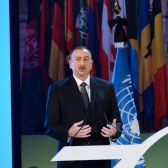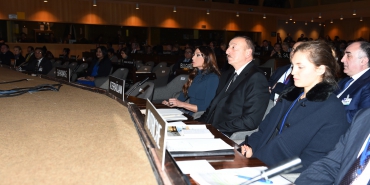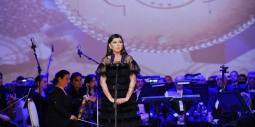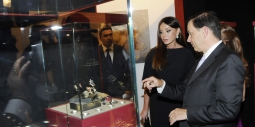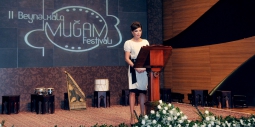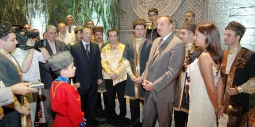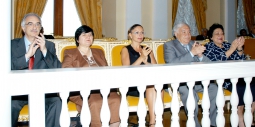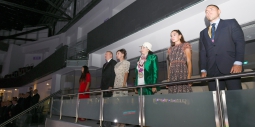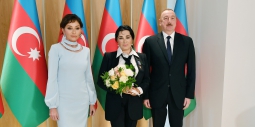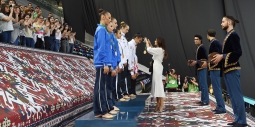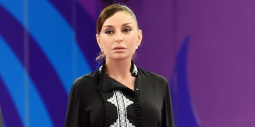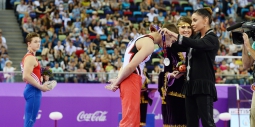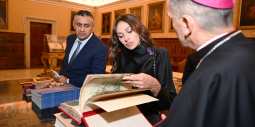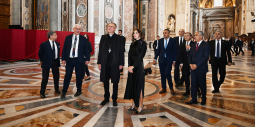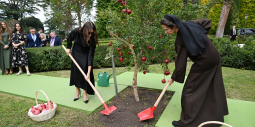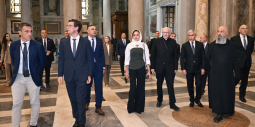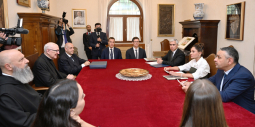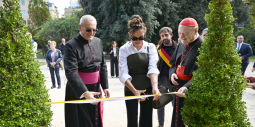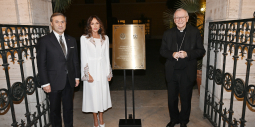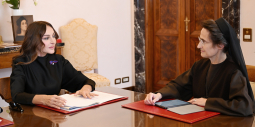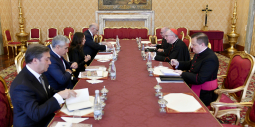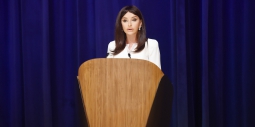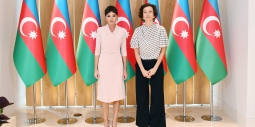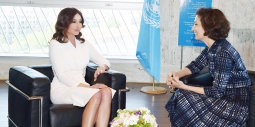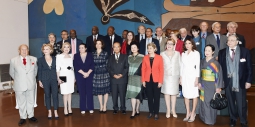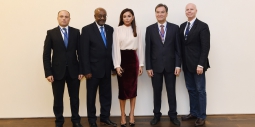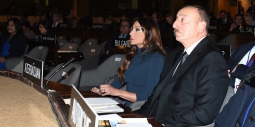President Ilham Aliyev and First Lady Mehriban Aliyeva participate in the Leaders’ Forum of the 38th Session of UNESCO General Conference
17.11.2015The Leaders’ Forum of the 38th Session of UNESCO General Conference took place in Paris on the occasion of the 70th anniversary of adoption of the organization’s Charter.
President of the Republic of Azerbaijan Ilham Aliyev and First Lady, UNESCO Goodwill Ambassador Mehriban Aliyeva participated in the Forum.
The President and the First Lady arrived at the organization’s headquarters to participate in the Forum.
First, President Ilham Aliyev wrote his heartfelt words into UNESCO’s Guests Book.
Azerbaijani President Ilham Aliyev and First Lady Mehriban Aliyeva had a brief meeting with former UNESCO Director General Koichiro Matsuura.
Chairperson of the 38th Session of UNESCO General Conference, Deputy Minister of Information and Communication Technologies of Namibia Stanley Mutumba Simataa, opening the event, gave information about the Forum’s agenda.
Malta’s President Marie Louise Coleiro, delivering a speech at the Forum, said the world has significantly changed for the 70 years since the establishment of UNESCO. She mentioned that this Forum is a good event to define UNESCO’s future. Maltese President said development is associated with real cultural environment. She touched upon such issues as cultural diversity, education, illiteracy and gender equality, and underscored UNESCO’s role and joint activity in solution of global challenges.
Then Deputy Prime Minister of Slovakia, Foreign Minister Miroslav Laychak took the floor. Condemning the terrorist acts in Paris, he said terrorists are enemies of the whole world, and brought to attention the significance of joint struggle against terror. The deputy prime minister said UNESCO is of significant importance in building a world where there is no place for terrorism and extremism. Miroslav Laychak underscored the necessity of joining efforts in solving global issues.
Chairing the Forum, Stanley Mutumba Simataa talked about the sustainable economic development under the leadership of President Ilham Aliyev, and its image formed in the world. He said our country has become a reliable partner of UNESCO.
XXX
President Ilham Aliyev delivered a speech at the Forum:
Mr. President of the General Conference, Mr. President of the Executive Board, Madame Director General,
Dear friends,
Ladies and Gentlemen,
First of all I’d like to express the deepest condolences of the people of Azerbaijan to the people of France in connection with a terrible act of terror in Paris on November 13th. The Azerbaijani people share the pain of the people of France and stand shoulder to shoulder with them in this tragic moment in the history of the French Republic. This terrible act of terror once again shows that the international community should unite its efforts to combat this evil. No country in the world can be hundred percent guaranteed against these terrible attacks. Therefore, only unified efforts of the international community can help us to combat this evil. Azerbaijan, as a country which suffered from numerous terror attacks in the past, plays its role in the battle against terrorism, and this role is appreciated by the international community.
Azerbaijan is an active member of UNESCO. It is more than twenty three years ago, almost immediately after restoration of our independence, that Azerbaijan became a member of UNESCO and is playing its role in the promotion of values of humanity. Azerbaijan signed and ratified almost all the conventions and other legal instruments of UNESCO. In 2003, Azerbaijan and UNESCO signed the framework agreement on cooperation in the areas of culture, science, education and communication, which allowed Azerbaijan to become one of the donors of UNESCO. This is our obligation and commitment in front of the least developed countries.
Azerbaijan itself experienced poverty, economic devastation, occupation and economic decline in the beginning of our independence when we were the recipients of the international aid. So now it is our turn to pay back and to contribute to the cause of the development in the world. I am absolutely sure that the areas of UNESCO’s activities such as education, culture and, of course, science are the main areas for the development of the mankind, are the areas the development of which will make our world more secure and safe.
We are proud that historical monuments of Azerbaijan such as Old City, Shirvanshah Palace, Maiden Tower, Petroglyphs of Gobustan rocks are among the protected historical monuments of UNESCO in the list of world heritage. Azerbaijan is a land of ancient culture, history, traditions. But it is young as an independent state. Only 24 years. These years were the years of transformation from one political system to another, from plant economy to market economy. And during these years our country managed to succeed.
Today Azerbaijan is a reliable partner in the international arena. It is an active member of organizations which we are members of and our biggest political and diplomatic success was our election with the support of 155 countries to the United Nations Security Council in 2011. That was recognition by the international community of the role of Azerbaijan, our activity, our positive activity on the global arena and that was a sign of respect, sign of trust and sign of appreciation of what we have accomplished. And as a reliable member of the international community, during two years of our membership in Security Council, we addressed two important issues: fight against international terrorism, and intercultural dialogue. Unfortunately from the very beginning of our independence Azerbaijan became the subject of Armenian aggression. Occupation by Armenia of internationally recognized territories of Azerbaijan continues until these days. As a result of policy of ethnic cleansing against Azerbaijanis more than a million Azerbaijanis became refugees and internally displaced persons. 250,000 Azerbaijanis were deported and ethnically cleansed from Armenia. 750,000 became internally displaced in our own country.
We suffered a humanitarian catastrophe. And that was at the time when we were not economically developed and were very poor. Today watching the TV reports about the migration crisis, which Europe now is facing, of course, we understand the pain of the people who have to leave their homes. At the same time, we understand that it creates difficulties for those who live in Europe. But at the same time, we remember 1992-1993, those years when we in Azerbaijan had to accommodate one million people. At that time population of Azerbaijan was something more than 8 million. So it was one of the highest per capita numbers of refugees and IDPs in the world and we did everything in order to integrate refugees, IDPs into our society. Today they play a very important role in the development of our country.
Armenia not only violates international law norms, but also violates the historic justice. United Nations Security Council adopted four resolutions demanding immediate and unconditional withdrawal of the Armenian troops from the territory of Azerbaijan. Unfortunately more than 20 years have passed since that time and these resolutions have not been implemented. And here we come to a very important issue of the global security and global configuration on the international arena – decisions and resolutions of leading international bodies are ignored. And there is no punishment for that. Armenia continues to ignore Security Council resolutions and the are no consequences for that.
This issue must be seriously addressed. And we need to elaborate the mechanisms of implementation of the resolutions of Security Council to avoid double standards. Because we all know that in some cases Security Council resolutions are being implemented within days, if not hours. But in our case, for more than twenty years there has been no progress on the negotiation table because Armenia doesn’t want peace. They don’t want to live in peace with us. They want to keep occupational policy for as long as they can, and unfortunately they have succeeded so far.
But time is on our side. Time is on the side of justice, on the side of international law. And I am sure that Azerbaijan will restore its territorial integrity which is respected by the whole world. Territorial integrity of Azerbaijan has the same value as territorial integrity of any other country. As a result of the occupation our historical, architectural, religious monuments were destroyed.
You can find the images and videos on the internet. More than 600 historical and architectural monuments of Azerbaijan were totally destroyed by the Armenian armed forces. Twenty-two museums were destroyed, and 40,000 items, which were exhibited in those museums including the very precious items of our historical heritage, were stolen from our museums and then sold on different auctions. Ten mosques were demolished by Armenian occupants, while today in the center of Baku you can see an Armenian Church restored by the government of Azerbaijan. So this is the difference in approach to multiculturalism. This is the difference in approach to religious tolerance and this again shows that terrorism has no religion, has no nationality and it is absolutely unacceptable to link Islam with terrorism.
I represent a Muslim country, a country which suffered from Armenian terrorism, from occupation, from destruction of our historic monuments. Of course, we will return to our lands, we will restore our cities, build new schools and hospitals there. But we will not be able to restore our historic monuments. Armenians destroyed our historical heritage. But they cannot destroy our will, the will of refugees and IDPs who want to go back to their homes and the will of their children and grandchildren, who were born in Baku and other cities of Azerbaijan, who never saw their historical land. But they live with a strong will in their heart to return. And they will return. We will do everything in order to restore territorial integrity of Azerbaijan. Again I’d like to say that international law norms fully support Azerbaijan’s position. At the same time Nagorno-Karabakh is a historic land of Azerbaijan. The word “Karabakh” has Azerbaijani origin. It means ‘black garden’. It doesn’t mean anything in Armenian.
Armenians were settled in that area in the middle of the 19th century. If you look at the maps of the Tsarist Russia of the beginning of the 20th century you will see that the absolute majority of the names of the cities and villages of all the toponymes of today’s territory of Armenia have Azerbaijani origin. In 1918, when after the collapse of the Russian Empire the first Democratic Republic of Azerbaijan was established, one of the first decrees of that republic was to transfer Yerevan from Azerbaijan to Armenia. Today’s capital of Armenia is our historic city of Iravan, population of which in the beginning of the 20th century was 80 percent of Azerbaijani origin. Today, it is completely ethnically cleansed. So history and international law supports our position. As you can imagine this issue is number one for Azerbaijan, for every citizen of Azerbaijan. Despite these tragic events and occupation which continues until now, Azerbaijan managed to achieve great success in transformation.
We created strong democratic institutions, a modern, political system, multi-party system. Azerbaijan is a country where all the freedoms are respected: freedom of political activity, media freedom, freedom of assembly. According to the World Bank’s assessment in 2007, only 17 percent of Azerbaijan were internet users. In 2015, it is already 75 percent. And our plan is to cover the whole country with a broad band free internet. Therefore, this clearly demonstrates that the media freedom, freedom of information for us is one of the priorities.
As Mr. President mentioned, Azerbaijan made a great success in economic development. Despite of this heavy burden of refugees, economic growth during the last decade was one of the fastests in the world – more than 300 percent. By investing in human capital we managed to reduce dramatically the level of poverty from almost 50 percent to five percent in 10 years. Unemployment is even less than five percent. We have very low foreign debt - only 12 percent of GDP. And according to Davos Economic Forum Azerbaijan is number 40 with respect to global competitiveness of economy. So economic reforms allowed us to accumulate financial resources, and to channel them to social and infrastructural development.
We invest in the future, we invest in education. More than 3,000 schools were built during the last ten years in Azerbaijan taking into account that the number of schools, in general, is less than 5,000. We achieved almost hundred percent of literacy which creates a very strong intellectual potential for our future. More than 500 hospitals and medical institutions built during the last ten years allow our people to have access to modern medical services. So human capital development for us always was and is a serious priority.
As Mr. President mentioned Azerbaijan plays a very active role in the dialogue of civilizations and cultures. We are proud that UNESCO is an official partner of the three forums which we held on intercultural dialogue and unique role which Azerbaijan plays as a country situated between East and West, a country with a predominantly Muslim population, but with secular society and secular government, which is a member of the Council of Europe and the Islamic Cooperation Organization. And we are trying to use this great opportunity to bring peoples closer, civilizations closer. Baku Process which we launched in 2008, when we invited the ministers of culture of members of the Organization of Islamic Cooperation to attend a meeting of ministers of culture of the Council of Europe in Baku was the first step. Then, in 2009, we did the opposite way. There was a meeting of ministers of culture of Islamic states, and we invited members of the Council of Europe.
Intercultural dialogue today is needed as never before. When we launched Baku Process situation in the world in 2008 was absolutely different. Today we see that the level of mutual mistrust is growing. We see that if we don’t take adequate measures the confrontation based on the religious, ethnic grounds will create even bigger problems for all of us. But we can live in peace. And, I think, the example of countries like Azerbaijan demonstrates that. In our country representatives of all religions live in peace and friendship. Our government, state invests into the construction of not only mosques, but construction and reconstruction of churches, Orthodox and Catholic churches, synagogues. We are proud that one of the oldest, maybe the oldest church in the Caucasus, is situated in Azerbaijan, near the ancient city of Shaki. We are also proud that one of the most ancient mosques, which was built in 1743, is situated in the ancient Azerbaijani city of Shamakhi. All the representatives of different confessions celebrate religious holidays at the same table.
Therefore, multiculturalism for us is not just an idea which is being discussed today whether it works or doesn’t work, whether it’s failed or not, for us multiculturalism is our tradition. Today it is not only tradition, it is a straight state policy, and our lifestyle. And it is possible. Because again we accumulated very important experience in that area. One example, this year Azerbaijan hosted the inaugural European Games. I think it was very strange that all the continents except Europe had their Games. The motherland of the Olympic Games is ancient Greece. Then Baron de Coubertin restored it here in France, but Europe never had it. So a very wise decision of the European Olympic Committees to hold the first Games in a Muslim country shows that ideals of multiculturalism, tolerance are very important for all of us.
The games were a real success with more than 6,000 athletes representing 50 Olympic committees of Europe. In 2017, we will host Islamic Solidarity Games. And Azerbaijan and Baku probably will be the only country in the world for many-many years to come that will have these two events in one and the same city. And we will continue to contribute to the cause of mutual understanding because multiculturalism is based on mutual understanding, on mutual respect. You should respect other religions the same ways as you respect your own. You should live side by side with your neighbors not asking him his nationality and whether he prays in the church, synagogue or in the mosque. Only in this case we can reduce potential risks, we can eliminate growing tensions. Situation in the world is changing, and, unfortunately, not in the direction we would like to see. We need to unite the efforts. We in Azerbaijan are doing our part of the job in order to bring continents, civilizations together. As Mr. President of the Conference mentioned next year we will host the Alliance of Civilizations Forum, which will be a global event particularly aimed at discussing the issues of multiculturalism, religious and ethnic tolerance. And I’d like to underline the unique role of UNESCO in these issues. We fully support the activity of UNESCO and a strong leadership of Director General Madame Bokova. Azerbaijan will do everything in order to support UNESCO in all its noble activities.
Once again, I’d like to welcome you, express my respect to you, and congratulate UNESCO on the 70th anniversary.
Thank you very much.
XXX
Then the letter addressed by US President Barak Obama was read.
Thereafter, French President Francois Hollande took the floor. He talked about the terrorist acts committed in Paris, and said France would give sharply respond to terrorists. The French President said terrorism was a great threat to universal values.
President Francois Hollande talked about the solidarity shown all over the world towards the people of France in connection with the terrorist acts. He emphasized that those who have committed these terrorist attacks are murderers, and they do not relate to any civilization.
The head of the French state said UNESCVO has been playing a key role in preserving universal values, and emphasized that the organization restored monuments destroyed in Afghanistan, Mali and other countries. The French President brought also to attention that UNESCO has implemented a number of projects related to preserving cultural values.
XXX
Thereafter, President Ilham Aliyev and First Lady Mehriban Aliyeva familiarized themselves with the hall of the Executive Council of UNESCO and delegations’ salon at the organization’s headquarters. It was mentioned that high-level renovation of the hall and salon was possible due to the support provided by the state of Azerbaijan. Meetings of goodwill ambassadors and assemblies take place in the hall, along with events of the Executive Council.
The President and the First Lady viewed stone statues of a horse and ram presented by the Republic of Azerbaijan on the 20th anniversary of our country’s membership with UNESCO.
Put in UNESCO headquarters’ yard, these statues are permanently displayed here. These statues relate to the 12-13th centuries AD and were found in Ashaghy Ayibli village of Tovuz district.
President Ilham Aliyev and First Lady Mehriban Aliyeva viewed also monuments presented by other countries to UNESCO. Displayed in the headquarters’ yard and building, these monuments are of historical and cultural significance.



